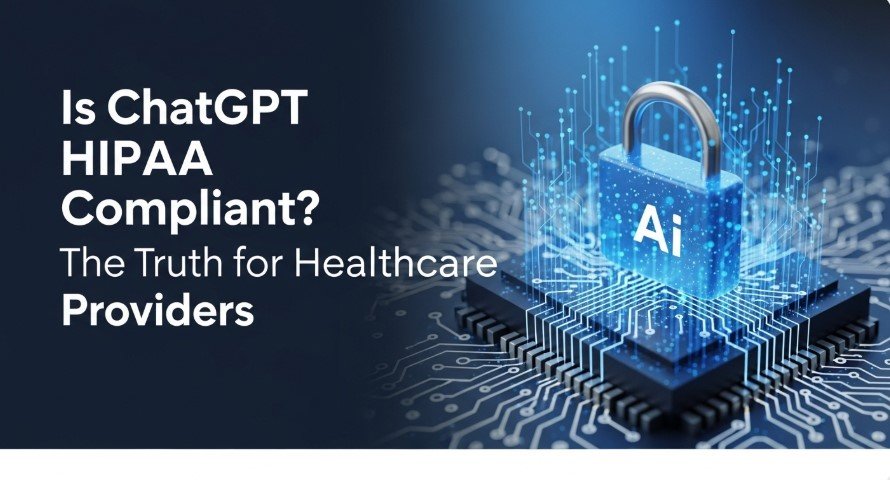Artificial Intelligence (AI) is changing healthcare. It helps with tasks like patient care and decision-making. ChatGPT, created by OpenAI, is a popular AI tool for generating human-like text. But is ChatGPT HIPAA compliant? The Health Insurance Portability and Accountability Act (HIPAA) protects patient health information. Non-compliance can lead to fines and loss of trust. This article covers ChatGPT’s HIPAA compliance, safe usage, and alternatives for healthcare providers.
What is HIPAA?
HIPAA, enacted in 1996, is a U.S. law that safeguards Protected Health Information (PHI). PHI includes data like medical records or personal details that can identify a patient. HIPAA applies to doctors, hospitals, health plans, and their business associates.
HIPAA has three main rules:
- Privacy Rule: Protects patient confidentiality by limiting PHI use and disclosure.
- Security Rule: Requires safeguards like encryption for electronic PHI (ePHI).
- Breach Notification Rule: Mandates reporting data breaches to affected individuals and authorities.
Fines for non-compliance range from $100 to $50,000 per violation, up to $1.5 million annually. Learn more at HHS HIPAA Guidelines.
Is ChatGPT HIPAA Compliant?
As of July 2025, standard ChatGPT is not HIPAA compliant. Here’s why:
- No Business Associate Agreement (BAA): HIPAA requires a BAA for third parties handling PHI. OpenAI does not offer BAAs, even for ChatGPT Enterprise.
- Data Retention: OpenAI keeps ChatGPT data for up to 30 days for monitoring, even if users opt out of training data use. This violates HIPAA’s strict rules.
- Weak Security: ChatGPT lacks the encryption and access controls needed for HIPAA compliance.
Entering PHI, like patient notes, into ChatGPT risks a HIPAA violation and potential data breaches.
How to Use ChatGPT in a HIPAA-Compliant Way
Healthcare providers can use AI safely with these steps:
- De-identify PHI: Remove all 18 HIPAA identifiers (e.g., names, dates) before using ChatGPT. For example, ask for a general diabetes treatment template instead of patient-specific data.
- Use Compliant Proxies: Tools like CompliantChatGPT replace PHI with tokens before sending data to OpenA.
- Limit Access: Restrict ChatGPT use to trained staff and monitor interactions.
- Encrypt Data: Use encryption for any data sent to AI tools via compliant proxies.
- Train and Audit: Educate staff on HIPAA and conduct regular compliance audits.
For example, instead of entering “John Doe’s diabetes plan,” ask, “Create a template for diabetes treatment notes.”
Alternatives to ChatGPT for Healthcare
HIPAA-compliant AI tools are available for healthcare:
- BastionGPT: Offers a BAA and supports tasks like documentation.
- CompliantChatGPT: A secure AI platform with a BAA for healthcare use.
- Other Tools: Platforms like gpt-MD and SuperOps.ai are built for HIPAA compliance.
| Feature | Standard ChatGPT | BastionGPT | CompliantChatGPT |
|---|---|---|---|
| BAA Available | No | Yes | Yes |
| Data Retention | Up to 30 days | None | None |
| HIPAA Compliance | No | Yes | Yes |
| Encryption | Limited | HIPAA-grade | HIPAA-grade |
Risks of Using Non-Compliant AI Tools
Using non-compliant AI like ChatGPT in healthcare can cause:
- Legal Penalties: Fines up to $50,000 per violation, with a $1.5 million annual cap.
- Data Breaches: Unsecured PHI can lead to breaches and loss of trust.
- Reputational Harm: Non-compliance can damage a provider’s reputation.
Even accidental PHI entry into ChatGPT is a breach under HIPAA.
Future of AI in Healthcare and HIPAA
AI is growing in healthcare for tasks like scheduling and triage. Regulations may evolve to address AI challenges. OpenAI is exploring compliant solutions. Providers should stay updated and use compliant tools.
Conclusion
ChatGPT is not HIPAA compliant in 2025 due to missing BAAs and data retention policies. Healthcare providers can use it safely by de-identifying PHI or choosing alternatives like BastionGPT. Protecting patient data is critical to avoid legal and ethical issues. Monitor AI and HIPAA updates to use these tools effectively.
FAQs
Is ChatGPT HIPAA compliant in 2025?
No, it lacks a BAA and retains data, violating HIPAA rules.
Can healthcare providers use ChatGPT?
Yes, with de-identified data or compliant proxies.
What are HIPAA-compliant ChatGPT alternatives?
BastionGPT and CompliantChatGPT offer HIPAA compliance.
How can I ensure AI use is HIPAA compliant?
Use tools with BAAs, de-identify PHI, and encrypt data.
What are the risks of non-compliant AI?
Fines, data breaches, and reputational damage.
Explore more:
